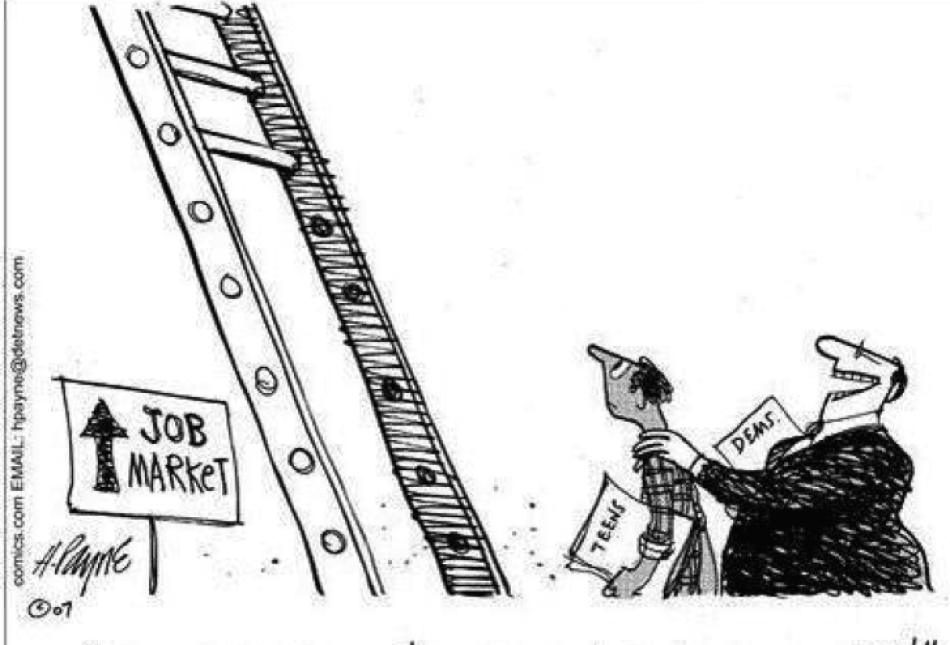Higher Minimum Wage Hurts Teens

Just over a year ago, both the U.S. Congress and the New Mexico Legislature passed minimum wage hikes. New Mexico acted first, raising the rate to $6.50 per hour (to be increased to $7.50 by January of 2009). The federal wage was raised to $5.85 an hour with that rate set to rise to $7.25 by July of 2009.
Thus, in New Mexico, the minimum wage will rise in steps to $7.50 while states adhering to the federal rate will see wage hikes stop at $7.25 an hour. Unfortunately, while both Congress and Governor Richardson billed the hikes as being good for low-wage workers, as the economy has softened over the last year, increasing numbers of people at the fringes of the work force are unable to find work at all.
Nationwide, in fact, teen unemployment increased by 3.3 percent, and for blacks the rate went up 1.1 percent in May. The unemployment rate for teenagers is 18.7% and 9.7% for African-Americans. Although the government doesn’t track the number, disabled Americans face an even harder time finding work.
The problem with minimum wage laws is that they don’t increase skills or productivity. All they do is prohibit employers from paying below a certain rate. So employers become pickier. Increase the amount they must pay and they will naturally try to find every way they can to increase the productivity of those employees affected by the new minimum.
They tend to fire (or not hire) inexperienced workers, like teenagers, and those who have invested the least in their own skill set — historically, in America, that amounts to a statistically large percentage of African Americans. It is therefore fringe workers, most of whom have little political power, that bear the brunt of the burden of minimum wage laws.
While the negative impact of a minimum wage hike may not be readily apparent when the economy is strong and businesses are hiring new workers, the fact is that the economy has slowed significantly. According to data from the federal government, this is the worst hiring market for teenagers in the 60-years the data has been collected.
It would be impossible to allot blame accurately between minimum wage hikes and the weak economy in driving unemployment upward at the margins, but there is no doubt that a higher minimum wage is making it more difficult for these people to find jobs. Worse, unless the national economy makes a rapid turnaround, as the minimum wage rises, those on the fringes of the job market will face even greater difficulties.
Decision makers and those who, despite difficult economic conditions, are not threatened with being laid off, should consider ways to mitigate the negative impact of mandated wage laws. While we at the Rio Grande Foundation would argue that government regulations should never come between voluntary agreements reached by workers and their employees, perhaps we can all agree to help those on the fringes of the workforce obtain employment.
One simple idea might be to exempt teenagers from minimum wage laws. After all, for most teenagers, especially those who are looking for their very first job, it is experience and the responsibility of work that is of primary concern. Money, while important, is of secondary concern.
Perhaps also, in times of rising unemployment and weak hiring, employers and their workers should be given greater flexibility in arriving at wage agreements. After all, while the wage rate has not yet reached $7.50 an hour, the fact that employers will soon be forced to offer their minimum wage workers a 15 percent raise has undoubtedly had a chilling effect on hiring above and beyond the wage hike already in effect. Some kind of trigger mechanism that freezes the wage hike until the economy strengthens could be implemented.
The fact remains that in a free economy no one knows better than employers and their workers what wages should be. Unfortunately, we have already crossed that bridge and there seems to be little chance of going back. The best we can do is mitigate the harm done to those being squeezed by artificially-raised wages and a difficult economic outlook.
Paul Gessing is the President of New Mexico’s Rio Grande Foundation. The Rio Grande Foundation is an independent, non-partisan, tax-exempt research and educational organization dedicated to promoting prosperity for New Mexico based on principles of limited government, economic freedom and individual responsibility.
